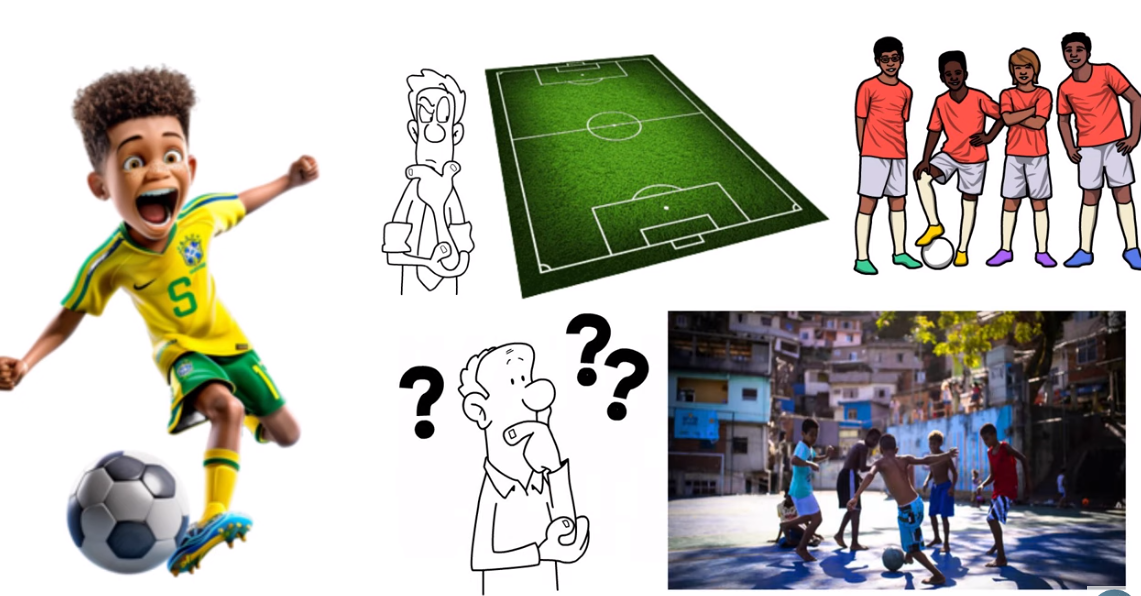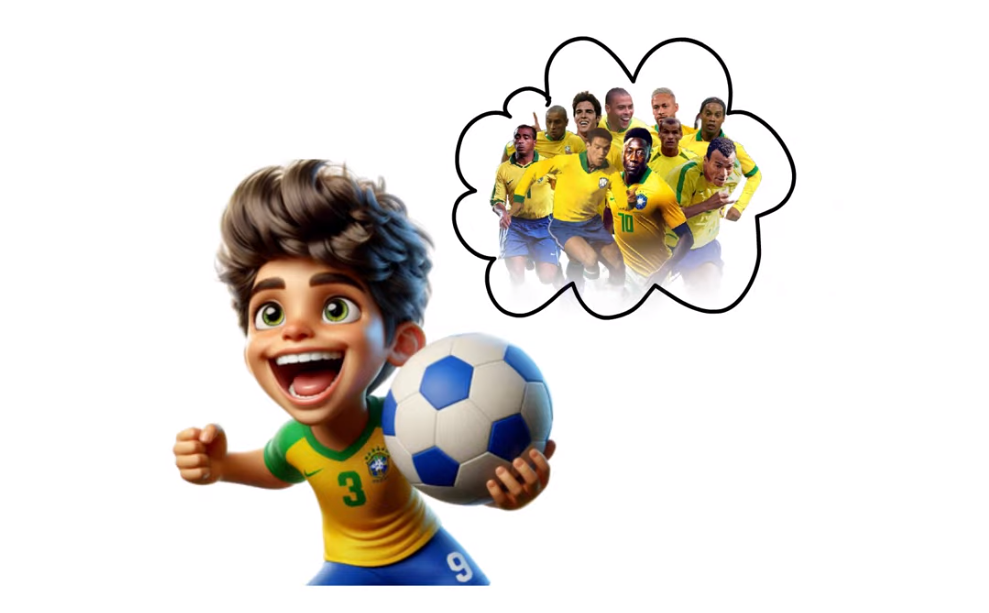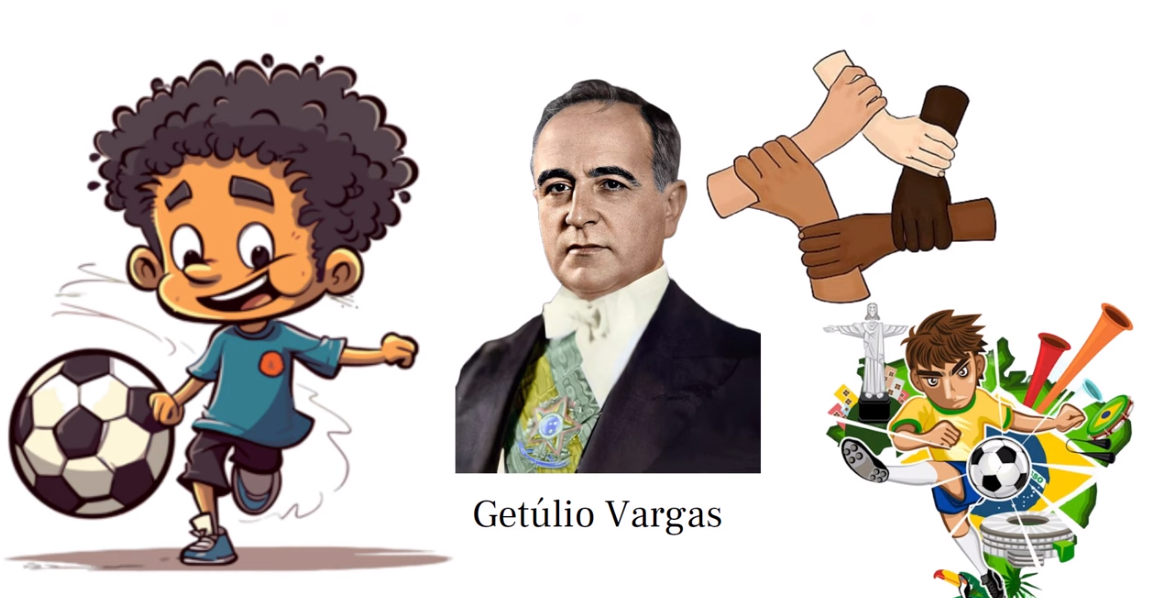If just having a large population was enough, China and India would have won the World Cup a long time ago. If just being wealthy was enough to win the World Cup, the USA would have won it long ago. If just strength and physical fitness were enough to win the World Cup, perhaps some African country would have won it a long time ago. Brazil seems to have all the factors mentioned above. They have a large population, over 200 million people. They have strength and physical fitness, a combination of people of African and European descent. They are also a strong economic country, although the wealth gap is still significant. Why are Brazilians so good at football?
Perhaps to thoroughly answer all these questions would require a lot of research because once researched, one can apply Brazil's methods to their own country, and perhaps many football nations around the world have been and are studying Brazil's success to create a similar formula for themselves. Hopefully, the explanations below can help you understand somewhat. Why are Brazilians successful in football? First, let's see how Brazilian football is successful.

For many Vietnamese children growing up in the 80s and 90s, the Brazilian national team was often assumed to be the strongest team in the world. Back then, going to the village football field with a yellow and green Brazil jersey was super cool. Brazil is one of the most successful national teams in the world, having won the World Cup five times in 58, 62, 70, 94, and 2002. They are the only team to have participated in every World Cup ever held. Over the years, they have produced stars like Pele, Cafu, Romario, Roberto Carlos, Rivaldo, Ronaldo, Ronaldinho, Kaka, Neymar,... In every era, Brazil has had stars. The most common reason we always hear, and it should be reiterated because it is always the first thing people mention when talking about Brazil's football success, is street football.
The main reason Brazil has the best players is because of street football. In Brazil, children learn to play football on the streets from a young age. In fact, most people often do not have enough money to buy a ball, which is a story we often hear. Therefore, they use balls made from old socks or sometimes stuff newspapers inside. This is a very common anecdote. There are many slopes, and that is a challenge for teams playing below because the kids have to overcome such slopes to score. In short, the standard here is to play in the harshest conditions imaginable, and the standard is that there are no standards at all.
Due to the conditions in Brazil, young players rarely play on grass fields, so when they become professionals, they face any material and that is not a big issue. Many international football teams find it difficult to compete in non-standard conditions. However, for Brazilian football, that is completely normal, but remember that in this world, slums and difficult places are not lacking, and Brazil is not the only place where children play football like that.

Why do Vietnamese children playing football on freshly harvested rice fields, which are also bumpy and uneven, not succeed like that? In terms of difficulty, it is not lacking either. Therefore, street football should be seen as one of the many reasons leading to the success of Brazilian football in general. And we will move on to another story: Brazilians succeed because they have idols. Any child growing up has their own idol. When you have a great idol, football will develop strongly, and young players will want to become heroes in the future.
Throughout history, there have been many notable Brazilian players, who have all become idols for generations, such as Pele, Ronaldo, Kaka, Carlos,... They are all very influential, everyone wants to become the new Pele, the new Ronaldo, the new Kaka, the new Carlos, the new Neymar, and of course, become new players. This is not only because these people play football well but also because they are very successful, they have a lot of money, they can control others, they can enjoy life. They have beautiful girls by their side; in Brazilian football, if you play well, you will have everything in this life.
The next reason for Brazilian success is Brazilians play football because it is the national sport, children play football in Brazil on the streets with their friends, and the people discuss matches. Spectators exchange stories at a diner, a restaurant, or a bar; companies even give their employees time off to watch World Cup matches, which is common. There are over 16,000 Brazilians playing professional football around the world; let me reiterate, around the world, now if one or two Vietnamese players go abroad, it is already highly praised, but Brazil has over 16,000 players worldwide and nearly 800 different football clubs. That is an indispensable aspect of Brazilian culture and lifestyle.
When young players are selected for the Brazilian national team, it is often the proudest moment of their lives. Brazil is passionate about this sport, so players want to make their country proud; they never take for granted the opportunity they are given and enjoy the fact that they are playing on the field, and Brazilians play football to have fun. They step onto the field with smiles on their faces; Brazilian fans are considered some of the most passionate supporters in the world, and there are many reasons to explain this. The whole country embraces football, and for some, it is considered a second religion.
Brazilians do their best to pursue football, to support their team, to support their idols, and above all, Brazilian football is successful because football connects an entire nation, football unites people together like a religion; football is a second religion, it is intertwined with Brazil's history. The English invented modern football and brought it to Brazil in the 1890s. Not long before that, there were some teams in Sao Paulo and Rio de Janeiro, these teams were mainly made up of European immigrants, white people only.

Then the Brazilians, the local natives, watched and played; they formed their own football clubs because most of them were not welcomed in all-white, European clubs. Brazilians celebrated when they gathered their best players to defeat the English team in 1914. They celebrated again when their team won the South American championship in 1919. The decisive goal in that final was scored by a Brazilian of African descent, and this player could only play for the Brazilian team, the team of white people, because his father was German. This shows that racial discrimination was very common in Brazilian football.
The goal-scoring player of African descent also had to ensure that he was never photographed with his colored mother and had to style his curly hair before each match to look like a white player. However, when white Brazilians discovered that victories brought pride to their nation, they were willing to overlook those prejudices, and politicians saw this as the best opportunity to unite an entire football nation.

In the 1930s, Brazilians realized that football was the best way to unite the country, the first being the dictatorial president Getulio Vargas. He did not like football, but he used it to unite people and ease social tensions; football perfectly reflected his multi-ethnic country, where all races had to work together, fight together, and sacrifice together to win. Thus, Brazilians recognized the importance of people of color and praised the contributions of people of color in football.
Brazil believes that the flexible and creative playing style of Brazilians is a result of African heritage, contrasting with the rigid and uncreative style of European teams. This combination of the popular and the elite has created a stable foundation for the connection between football and Brazilian national identity, and let’s look at the greatest player in Brazil's history, the king of football, Pele. He is a person of color, and the fact is that Brazil is not only good at football; they are also good at all other sports related to the ball.
